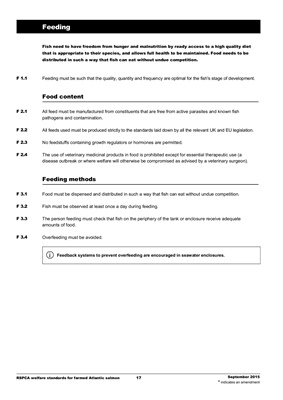
RSPCA welfare standards for farmed Atlantic salmon 17 September 2015
* indicates an amendment
Feeding
Fish need to have freedom from hunger and malnutrition by ready access to a high quality diet
that is appropriate to their species, and allows full health to be maintained. Food needs to be
distributed in such a way that fish can eat without undue competition.
F 1.1 Feeding must be such that the quality, quantity and frequency are optimal for the fish's stage of development.
Food content
F 2.1 All feed must be manufactured from constituents that are free from active parasites and known fish
pathogens and contamination.
F 2.2 All feeds used must be produced strictly to the standards laid down by all the relevant UK and EU legislation.
F 2.3 No feedstuffs containing growth regulators or hormones are permitted.
F 2.4 The use of veterinary medicinal products in food is prohibited except for essential therapeutic use (a
disease outbreak or where welfare will otherwise be compromised as advised by a veterinary surgeon).
Feeding methods
F 3.1 Food must be dispensed and distributed in such a way that fish can eat without undue competition.
F 3.2 Fish must be observed at least once a day during feeding.
F 3.3 The person feeding must check that fish on the periphery of the tank or enclosure receive adequate
amounts of food.
F 3.4 Overfeeding must be avoided.
Feedback systems to prevent overfeeding are encouraged in seawater enclosures.
i